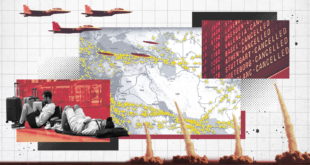BAGHDAD (AFP) — Iraqi Prime Minister Nouri Maliki on Saturday threatened to “review†relations with countries which criticised the bungled execution of Saddam Hussein, saying the hanging was an internal matter.
As Maliki lashed out at critics of his government, the bodies of 27 people killed execution-style were found in central Baghdad, providing more grisly evidence of Iraq’s raging sectarian conflict.
“The Iraqi government could be obliged to review its relations with any state that fails to respect the wish of the Iraqi people,†said Maliki in his first reaction to the ousted president’s hanging in Baghdad on December 30.
“We consider the execution an internal affair that concerns only the Iraqi people,†said Maliki, speaking at a ceremony on the 86th anniversary of the Iraqi army.
He slammed those who criticised the execution.
“We find that this conduct is inciting sedition and flagrant interference in the internal affairs of Iraq and abuses feelings of the families of the victims,†Maliki said.
A number of international leaders have criticised Saddam’s hanging, saying it appeared more like a sectarian lynching than a court-directed punishment after a guard, believed to be a Shiite, taunted the Sunni former president in his final moments.
The strongest criticism came from Egyptian President Hosni Mubarak, who said that the execution had made Saddam a “martyrâ€.
Echoing Mubarak’s view was German Foreign Minister Frank-Walter Steinmeier, who warned in an interview to be published on Sunday that Saddam could gain iconic status after his execution.
“There is surely a risk that this execution, carried out on a Muslim holiday and hyped up by the media, is creating the conditions to make Saddam a martyr to his countrymen,†he told the German weekly Bild am Sonntag.
“The first signs of this are the numerous visits to his tomb,†Steinmeier noted, adding that “it is still not clear if [the hanging] could lead to a new escalation of the violence in Iraqâ€.
Even US President George W. Bush on Thursday acknowledged that the execution should have been “more dignifiedâ€.
But Maliki insisted Saddam’s hanging was not a political act.
“The execution of the despot was not a political decision as suggested by the enemies of Iraqi people,†the premier said.
“The decision was implemented after a just trial which the leader did not deserve as the crimes he committed against the people, the country and its institutions were disgraceful.†Maliki said the criticism would not deter his government from punishing other officials of the ousted regime.
“We will go ahead in applying the law against those who abused the Iraqi people and whose hands are stained with the blood of innocents,†he said.
Two former Saddam aides — Barzan Ibrahim Tikriti and Awad Ahmed Bandar — are expected to be hanged soon. They were found guilty along with Saddam of executing 148 Shiite civilians from Dujail, north of Baghdad, in the 1980s.
Saddam’s execution further widened the chasm between Iraq’s Shiite and Sunni communities after the distribution of a bootleg video of the hanging.
In the footage a member of the execution party could be heard shouting the name of Shiite cleric Moqtada Sadr — “Moqtada! Moqtada! Moqtada!†— at a sneering Saddam.
His execution came as more than 100 people were being killed daily in Iraq, mostly in Baghdad and largely in Shiite-Sunni sectarian violence, according to the United Nations.
On Saturday, police found the bodies of 27 people killed in such apparent attacks, a security official said. They were all found in one place near a Sunni shrine in central Baghdad’s Sheikh Marouf area.
Three people were also killed in two car bomb attacks despite a security plan in place in Baghdad since June 2006. Â
 Eurasia Press & News
Eurasia Press & News


